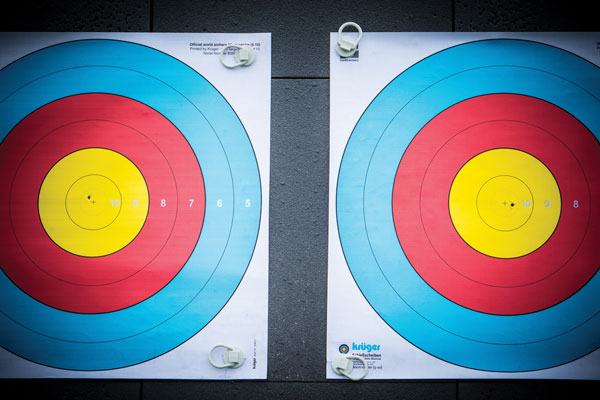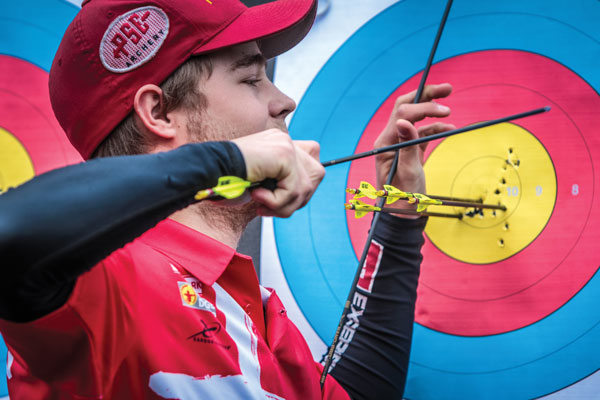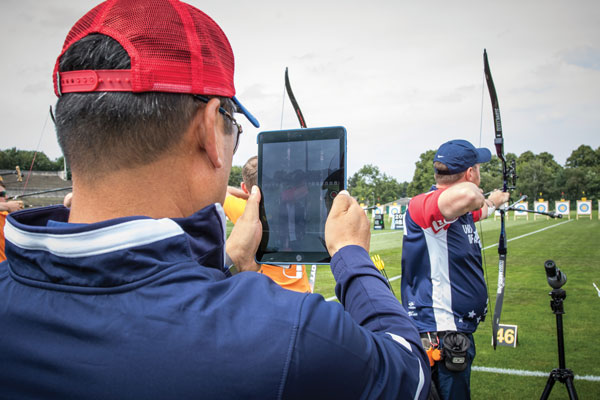Got something you want to achieve in archery? Smart goal setting will help you do it, explains John Stanley

Go for your goals with John Stanley’s advice
You’ve probably read many times of the importance of goal setting and how vital it is for success in any field. However, remarkably few people actually have written goals for any aspect of their lives. Archery is no different. Almost all archers want to grow and improve, but few carefully sit down and work out, in a structured way, exactly how they are going to do so.
A standard way of breaking down and classifying goals is to split them up into ‘outcomes’ and ‘processes’. Outcome goals are specific and time-based, such as “I want to get a job by the end of the month” or “I want to score at least 600 points at the shoot next week.”
Process goals are things done repeatedly to achieve an outcome goal. For example: “I want to apply for 10 jobs every single day” or “I want to focus on a clean release and follow-through until it’s a habit.”
At an international tournament a couple of years ago I noticed something attached to the quiver of Choi Misun, the Olympic team gold medallist and world record holder. It was a small laminated card with four short sentences in Hangul, the Korean script. After getting some help from a Korean friend, it turned out to be simpler than I was expecting:
1. Hold the left grip
2. Aim accurately
3. Maintain the bow arm until the end when shooting
4. Have trust and shoot confidently!
Perhaps they have lost a nuance or two in translation, or each of them is summarising hundreds of hours of elite coaching work, but that’s what it says. You may note that the card doesn’t mention an outcome, such as ‘I will win this tournament and stay the world number one for the next five years’ (even if that is on her goals list). When Choi Misun is shooting she is focusing on process goals, the individual steps that will allow her to shoot at the top of her game.

Archery requires a focus on the process – like all precision sports
You need both process goals and outcome goals to move forward, and it’s best to see them as two sides of the same coin. But archery, like all precision sports, is a discipline that requires a deep focus on the process rather than the outcome. Both the sport and human nature are good at diverting your attention to outcome-based goals, as archery progress is mainly measured in raw numbers.
It is a natural outcome goal to want to increase your score every time you compete, and the plateau that many beginner archers hit after a few months of improvement can often lead to giving up the sport altogether. To implement a new piece of technique and watch your scores plummet requires an iron will to see the process through to the other side with improved form and better results. It’s also normal to badly want to win a tournament you are entering, particularly if you know that you have a strong shot at it. But it’s going to hurt your score if that’s all you can think about when you’re standing on the line.
This doesn’t mean that outcome goals don’t have a vital part to play in driving and inspiring archery success. For example, many recurve archers have a dream of making their country’s national team and shooting at the Olympics. Of course this is extremely difficult, but it is the goal that inspires and drives many others. Indeed, achieving it is going to require a whole host of both process and outcome goals.
To make the Olympic team you will have to start shooting for your country at international events, which will need you to finish in the top four (for example) of the national trials, which will require to you to be shooting qualifying, competitive scores, which will require you to devote this much time to practice, and so on.
Achieving one smaller goal will help you to define future goals, too. Big, scary inspirational goals will invariably need to be broken down into multiple sub-goals in order to start moving. It’s become a bit of a truism: but you need to focus on the process rather than the result. This focus will take a lot of practice; we’ve all seen elite athletes collapse under pressure.

Choi Misun keeps her goals on her quiver, where she can see them regularly
Four steps to effective goal setting
Make your outcome goals S.M.A.R.T – outcome goals fire the imagination best when they are crystal-clear. A well-known framework for shaping goals uses the mnemonic acronym S.M.A.R.T., where goals should be:
– Specific
– Measurable
– Achievable
– Relevant
– Time-bound
There are whole books devoted to the subtleties of this framework, but to briefly summarise: instead of saying ‘I’d like to win the county tournament’, you would reframe it as, ‘I want to make the podium at the county tournament next September, shooting strongly and confidently.’ You could add: “with a ranking round score of at least (y), to enable me to qualify for (z).’
It doesn’t mean you will win it of course – you could still be outshot by better archers. But, assuming it’s achievable, this is a much more powerful tool that should help your subconscious find a pathway towards achieving it. You should make sure to state your goal in the present tense, as a statement of intent. It’s also a good idea to think of a short list of resources that will help you and support you along the way.

The outcome is never far from an archer’s mind, as both progress and achievement are measured in raw numbers
Goals need to be written down – where you can see them. Many studies show that people with written goals are more successful in achieving them. But, as often happens with ‘mission statements’ for businesses (often produced at a great deal of expense) written goals are just that: written down and shut away in a drawer, not to be seen again for some time.
To be effective, goals need to be part of your everyday life, at the top of your mind. This is especially the case with process goals.
There are many ways to do this; a common method is to put them somewhere you will see them every day – attached to a bedroom or bathroom mirror, the back of a door, taped to your desk, or anywhere that will definitely become part of your daily awareness. Some archers have them inside their case and occasionally even written on their bow or attached to their equipment, as with Choi Misun’s quiver above.
You could make an image of your written goals and use it as your desktop or phone background image; there are also apps that will flash goals up on your screen on a regular basis. Other productivity experts recommend more extreme measures such as reading them aloud three times every morning, or writing out your goals by hand each and every day. However you choose to do it, make sure they are part of your consciousness on a regular basis.

Be specific about your goal, and look at whether achieving it requires help from an outside source
Goals should motivate you – not someone else. It is important that goals should motivate you: this means making sure that they are valuable and you see the point in achieving them. If you are really not bothered about the outcome, or they don’t make a lot of difference to the wider picture, the chances of you putting in the difficult work to achieve them are pretty small. Too many people go through life achieving someone else’s goals! This is a good time to be listening to your inner voice, the little leap of excitement you get when you think of something awesome – and yet, possible.
Another good tip to make sure your goal is motivating is to ask yourself, “If I were to share this goal with others, what would I tell them to convince them it was worthwhile?” Listen to yourself. Are you convinced?

A goal like qualifying for an Olympics place will involve several sub-goals, such as making the international team and getting to the qualifying event
Goals are not carved in stone – goals should be tools that assist you throughout your life, and like any useful tools, they need maintenance and care to make sure they are still working for you. I’m sure that the goals you had when you were 10 years old are not the same as the goals you have reading this today. This is true year to year and month to month as well. Something may be now unattainable, or have become irrelevant.
It’s also worth examining your goals in detail – usually by continually asking the question ‘why?’ over and over again – in order to drill down into what is really important for you, and whether they are still relevant. It’s always good to have an idea what will happen if you don’t achieve a big outcome goal, too. Try and make sure your list and your goals are always fresh and exciting – and make sure to leave room for new challenges!
This article originally appeared in the issue 122 of Bow International magazine. For more great content like this, subscribe today at our secure online store: www.myfavouritemagazines.co.uk

